
BotServer
LLM Orchestrator automation open-source platform
Stars: 66
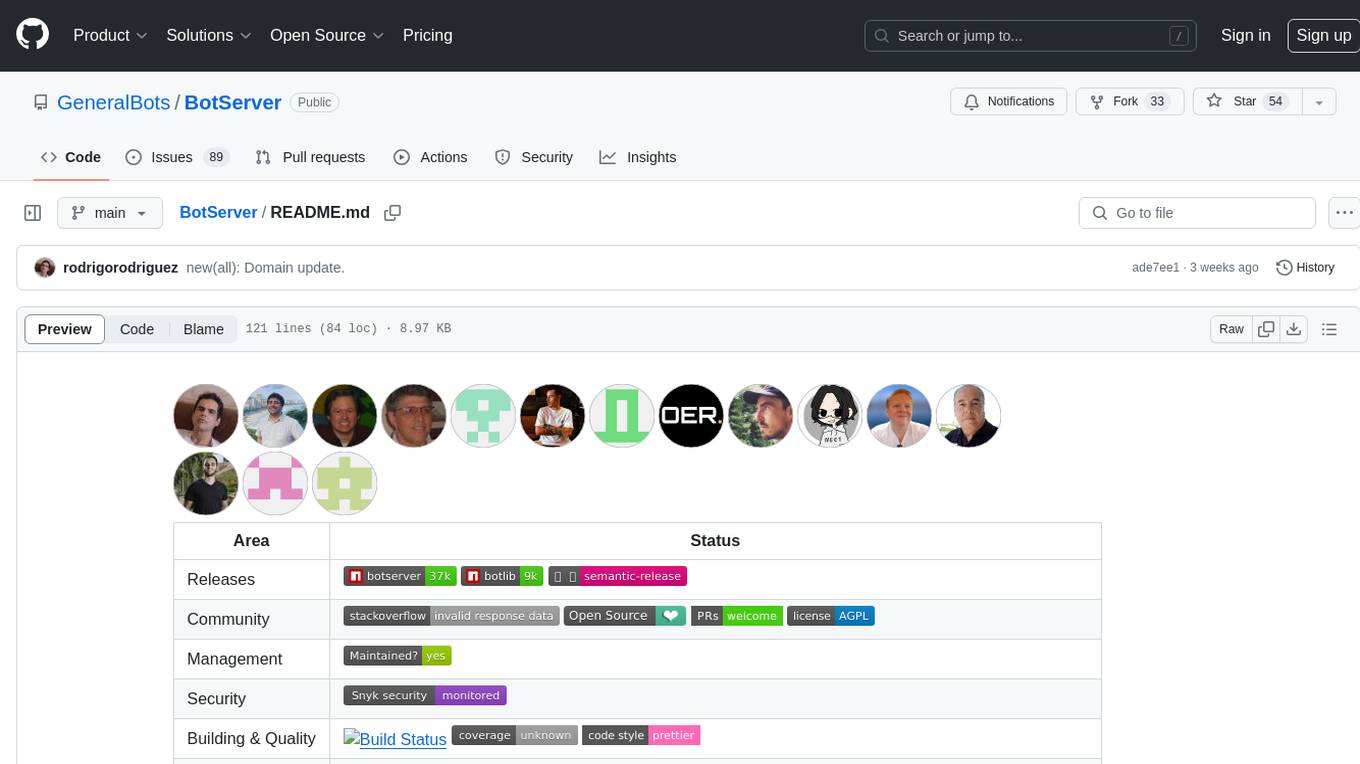
General Bot is a chat bot server that accelerates bot development by providing code base, resources, deployment to the cloud, and templates for creating new bots. It allows modification of bot packages without code through a database and service backend. Users can develop bot packages using custom code in editors like Visual Studio Code, Atom, or Brackets. The tool supports creating bots by copying and pasting files and using favorite tools from Office or Photoshop. It also enables building custom dialogs with BASIC for extending bots.
README:
- LLM Orchestrator AGPL licensed (to use as custom-label SaaS, contributing back)
- True community governance
- No single corporate control
- 5+ years of stability
- Never changed license
- Enterprise-grad
- Hosted locally or Multicloud
| Area | Status |
|---|---|
| Releases |
  
|
| Community |
  
|
| Management |  |
| Security | |
| Building & Quality |

|
| Packaging |

|
| Samples |
BASIC or |
Docker Image  Provided by @lpicanco |
General Bot is a strongly typed LLM conversational platform package based chat bot server focused in convention over configuration and code-less approaches, which brings software packages and application server concepts to help parallel bot development.
Bot Server accelerates the process of developing a bot. It provisions all code base, resources and deployment to the cloud, and gives you templates you can choose from whenever you need a new bot. The server has a database and service backend allowing you to further modify your bot package directly by downloading a zip file, editing and uploading it back to the server (deploying process) with no code. The Bot Server also provides a framework to develop bot packages in a more advanced fashion writing custom code in editors like Visual Studio Code, Atom or Brackets.
Everyone can create bots by just copying and pasting some files and using their favorite tools from Office (or any text editor) or Photoshop (or any image editor). LLM and BASIC can be mixed used to build custom dialogs so Bot can be extended just like VBA for Excel.
Before you embark on your General Bots journey, ensure you have the following tools installed:
- Node.js (version 20 or later): General Bots leverages the latest features of Node.js to provide a robust and efficient runtime environment. Download it from nodejs.org.
- Git (latest stable version): Essential for version control and collaborating on bot projects. Get it from git-scm.com.
Follow these steps to get your General Bots server up and running:
-
Clone the repository:
git clone https://github.com/GeneralBots/BotServer
This command creates a local copy of the General Bots server repository on your machine.
-
Navigate to the project directory:
cd BotServerThis changes your current directory to the newly cloned BotServer folder.
-
Install dependencies and start the server:
npm install npm run start
The
npm installcommand installs all necessary dependencies for the project.npm run startbuilds your bot server locally and serves it through a development server.
Once the server is running, you can access your bot at http://localhost:4242/. This local server allows you to interact with your bot and test its functionality in real-time. If you want to publish
without password, define ADMIN_OPEN_PUBLISH as true in BotServer .env file.
To publish bot packages and initiate a conversation with the bot, use the command:
/publish
This command prepares your bot packages for use and allows you to start interacting with your bot immediately.
The General Bots server follows a modular architecture designed for flexibility and scalability. Here's an overview of the main directories:
BotServer/
├── packages/
│ ├── core.gbapp/ # Core bot functionality
│ ├── kb.gbapp/ # Knowledge base packages
├── src / # Main entry point
└── package.json # Project configuration
This structure allows for easy navigation and management of different aspects of your bot project.
One of the strengths of General Bots is its extensibility. You can create custom packages to enhance your bot's capabilities:
- .gbkb (Knowledge Base packages): Store and manage your bot's knowledge and responses.
- .gbtheme (Theme packages): Customize the visual appearance of your bot interface.
- .gbapp (Application packages): Add new features and functionalities to your bot.
Each package type has its own structure and purpose, which we'll explore in depth in their respective chapters.
Several samples, including a Bot for AD Password Reset, are avaiable on the repository list.
TALK "General Bots Labs presents FISCAL DATA SHOW BY BASIC"
TALK "Gift Contributions to Reduce the Public Debt API (https://fiscaldata.treasury.gov/datasets/gift-contributions-reduce-debt-held-by-public/gift-contributions-to-reduce-the-public-debt)"
result = GET "https://api.fiscaldata.treasury.gov/services/api/fiscal_service/v2/accounting/od/gift_contributions?page[size]=500"
data = result.data
data = SELECT YEAR(record_date) as Yr, SUM(CAST(contribution_amt AS NUMBER)) AS Amount FROM data GROUP BY YEAR(record_date)
TALK "Demonstration of Gift Contributions with AS IMAGE keyword"
SET THEME dark
png = data as IMAGE
SEND FILE png
DELAY 5
TALK " Demonstration of Gift Contributions CHART keyword"
img = CHART "bar", data
SEND FILE img
Read the General Bots BotBook Guide
7 AI General Bots LLM Templates for Goodness https://www.youtube.com/watch?v=KJgvUPXi3Fw
This project welcomes contributions and suggestions. See our Contribution Guidelines for more details.
Security issues and bugs should be reported privately, via email, to the pragmatismo.cloud Security team at [email protected]. You should receive a response within 24 hours. If for some reason you do not, please follow up via email to ensure we received your original message.
General Bot Copyright (c) pragmatismo.cloud. All rights reserved. Licensed under the AGPL-3.0.
According to our dual licensing model, this program can be used either under the terms of the GNU Affero General Public License, version 3, or under a proprietary license.
The texts of the GNU Affero General Public License with an additional permission and of our proprietary license can be found at and in the LICENSE file you have received along with this program.
This program is distributed in the hope that it will be useful, but WITHOUT ANY WARRANTY; without even the implied warranty of MERCHANTABILITY or FITNESS FOR A PARTICULAR PURPOSE. See the GNU Affero General Public License for more details.
"General Bot" is a registered trademark of pragmatismo.cloud. The licensing of the program under the AGPLv3 does not imply a trademark license. Therefore any rights, title and interest in our trademarks remain entirely with us.
💬 Ask a question 📖 Read the Docs Team pictures made with contrib.rocks. General Bots Code Name is Guaribas, the name of a city in Brazil, state of Piaui. Roberto Mangabeira Unger: "No one should have to do work that can be done by a machine".
For Tasks:
Click tags to check more tools for each tasksFor Jobs:
Alternative AI tools for BotServer
Similar Open Source Tools

BotServer
General Bot is a chat bot server that accelerates bot development by providing code base, resources, deployment to the cloud, and templates for creating new bots. It allows modification of bot packages without code through a database and service backend. Users can develop bot packages using custom code in editors like Visual Studio Code, Atom, or Brackets. The tool supports creating bots by copying and pasting files and using favorite tools from Office or Photoshop. It also enables building custom dialogs with BASIC for extending bots.

agentok
Agentok Studio is a tool built upon AG2, a powerful agent framework from Microsoft, offering intuitive visual tools to streamline the creation and management of complex agent-based workflows. It simplifies the process for creators and developers by generating native Python code with minimal dependencies, enabling users to create self-contained code that can be executed anywhere. The tool is currently under development and not recommended for production use, but contributions are welcome from the community to enhance its capabilities and functionalities.

gptme
GPTMe is a tool that allows users to interact with an LLM assistant directly in their terminal in a chat-style interface. The tool provides features for the assistant to run shell commands, execute code, read/write files, and more, making it suitable for various development and terminal-based tasks. It serves as a local alternative to ChatGPT's 'Code Interpreter,' offering flexibility and privacy when using a local model. GPTMe supports code execution, file manipulation, context passing, self-correction, and works with various AI models like GPT-4. It also includes a GitHub Bot for requesting changes and operates entirely in GitHub Actions. In progress features include handling long contexts intelligently, a web UI and API for conversations, web and desktop vision, and a tree-based conversation structure.
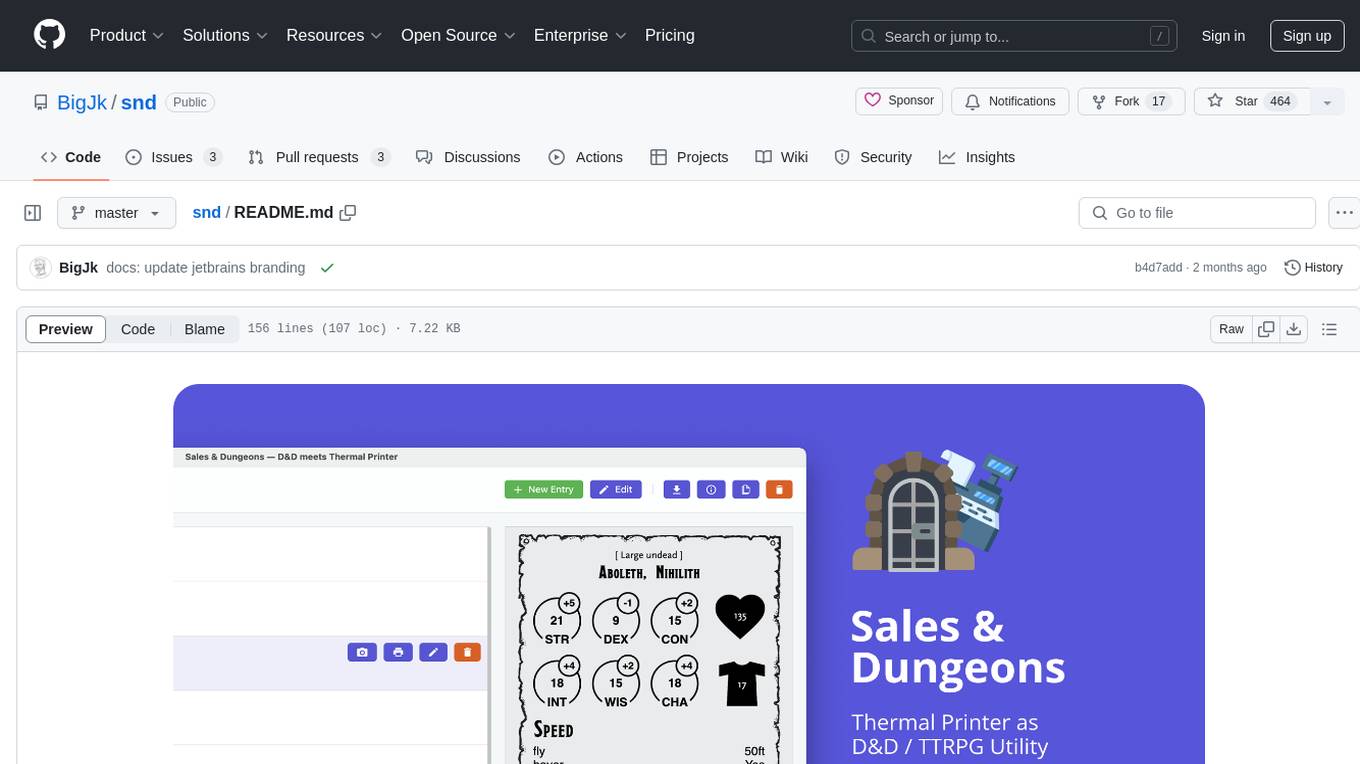
snd
Sales & Dungeons is a tool that utilizes thermal printers for creating customizable handouts, quick references, and more for Dungeons and Dragons sessions. It offers extensive templating and random generation systems, supports various connection methods, and allows importing/exporting templates and data sources. Users can access external data sources like Open5e, import data from CSV and other formats, and utilize AI prompt generation and translation. The tool supports cloud sync and is compatible with multiple operating systems and devices.
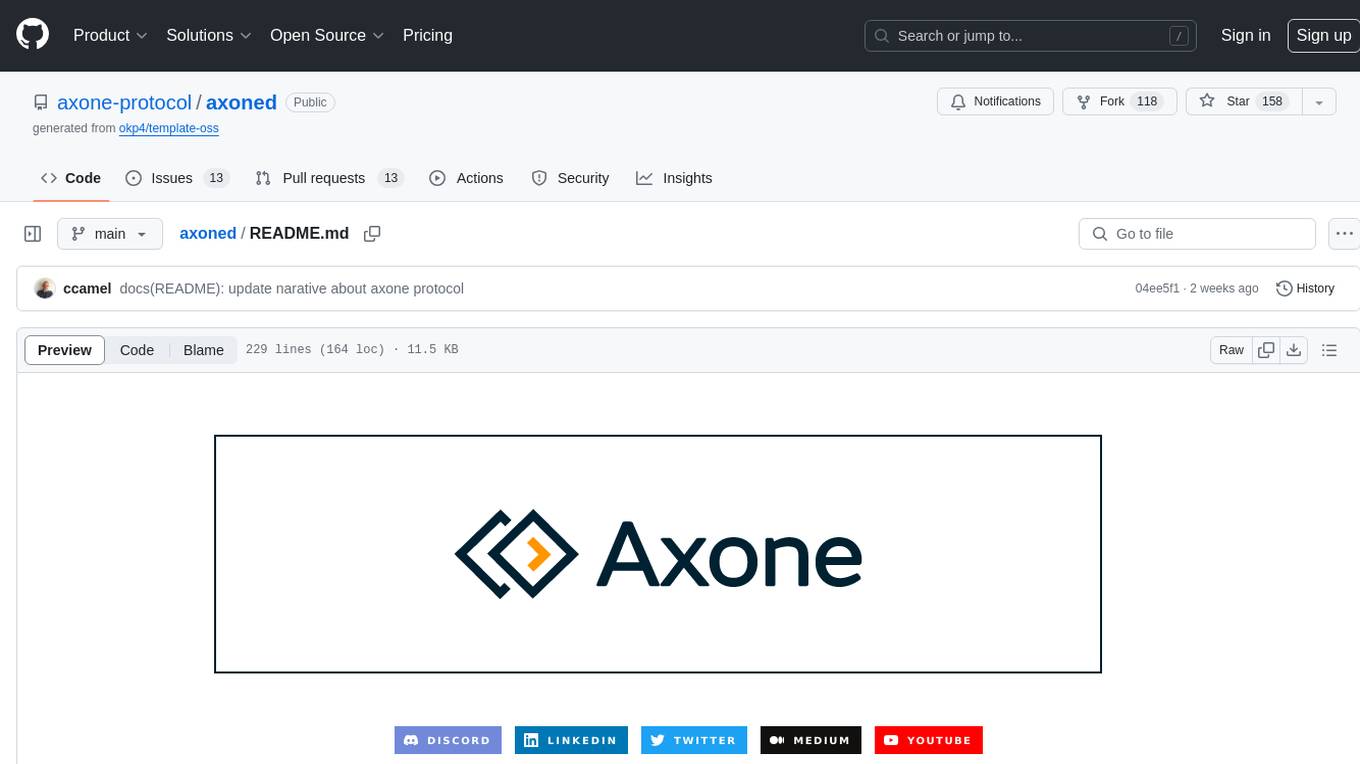
axoned
Axone is a public dPoS layer 1 designed for connecting, sharing, and monetizing resources in the AI stack. It is an open network for collaborative AI workflow management compatible with any data, model, or infrastructure, allowing sharing of data, algorithms, storage, compute, APIs, both on-chain and off-chain. The 'axoned' node of the AXONE network is built on Cosmos SDK & Tendermint consensus, enabling companies & individuals to define on-chain rules, share off-chain resources, and create new applications. Validators secure the network by maintaining uptime and staking $AXONE for rewards. The blockchain supports various platforms and follows Semantic Versioning 2.0.0. A docker image is available for quick start, with documentation on querying networks, creating wallets, starting nodes, and joining networks. Development involves Go and Cosmos SDK, with smart contracts deployed on the AXONE blockchain. The project provides a Makefile for building, installing, linting, and testing. Community involvement is encouraged through Discord, open issues, and pull requests.

gptme
Personal AI assistant/agent in your terminal, with tools for using the terminal, running code, editing files, browsing the web, using vision, and more. A great coding agent that is general-purpose to assist in all kinds of knowledge work, from a simple but powerful CLI. An unconstrained local alternative to ChatGPT with 'Code Interpreter', Cursor Agent, etc. Not limited by lack of software, internet access, timeouts, or privacy concerns if using local models.
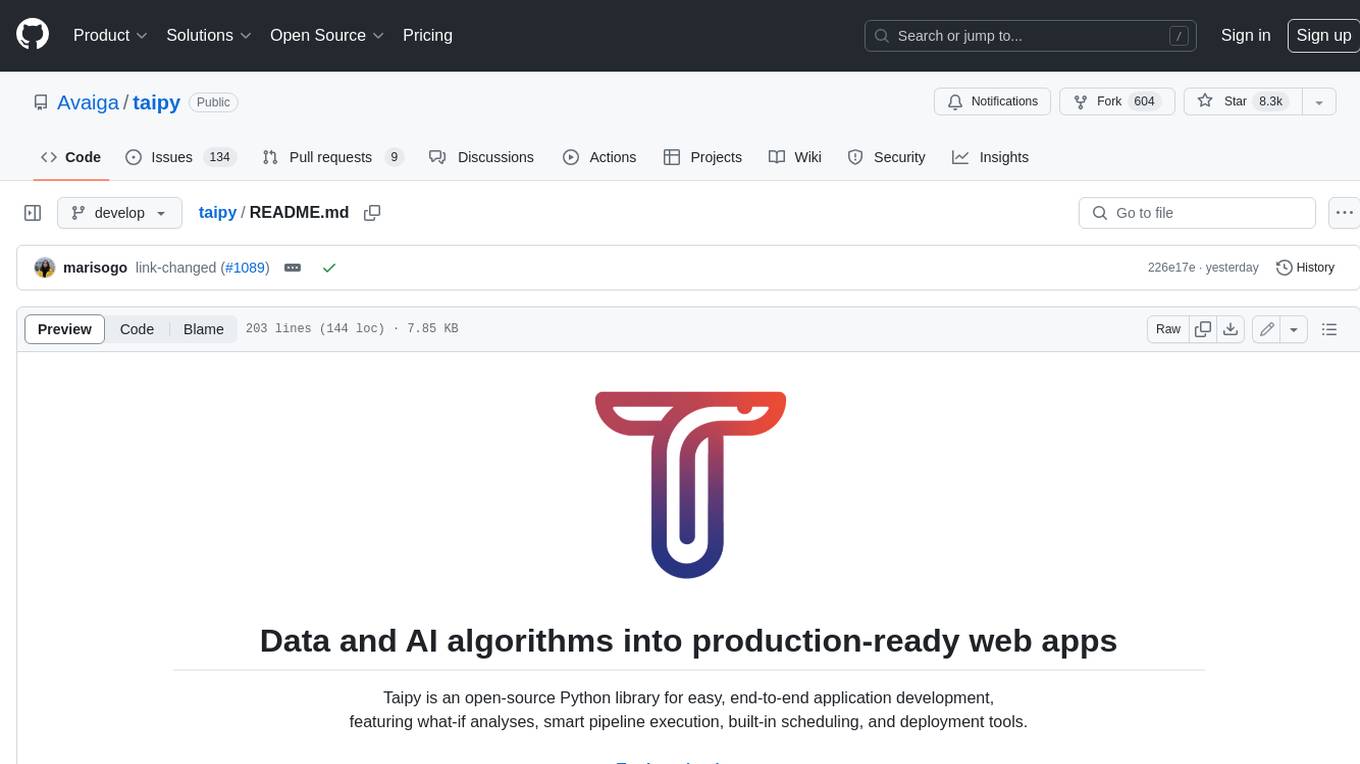
taipy
Taipy is an open-source Python library for easy, end-to-end application development, featuring what-if analyses, smart pipeline execution, built-in scheduling, and deployment tools.

chainlit
Chainlit is an open-source async Python framework which allows developers to build scalable Conversational AI or agentic applications. It enables users to create ChatGPT-like applications, embedded chatbots, custom frontends, and API endpoints. The framework provides features such as multi-modal chats, chain of thought visualization, data persistence, human feedback, and an in-context prompt playground. Chainlit is compatible with various Python programs and libraries, including LangChain, Llama Index, Autogen, OpenAI Assistant, and Haystack. It offers a range of examples and a cookbook to showcase its capabilities and inspire users. Chainlit welcomes contributions and is licensed under the Apache 2.0 license.

devchat
DevChat is an open-source workflow engine that enables developers to create intelligent, automated workflows for engaging with users through a chat panel within their IDEs. It combines script writing flexibility, latest AI models, and an intuitive chat GUI to enhance user experience and productivity. DevChat simplifies the integration of AI in software development, unlocking new possibilities for developers.
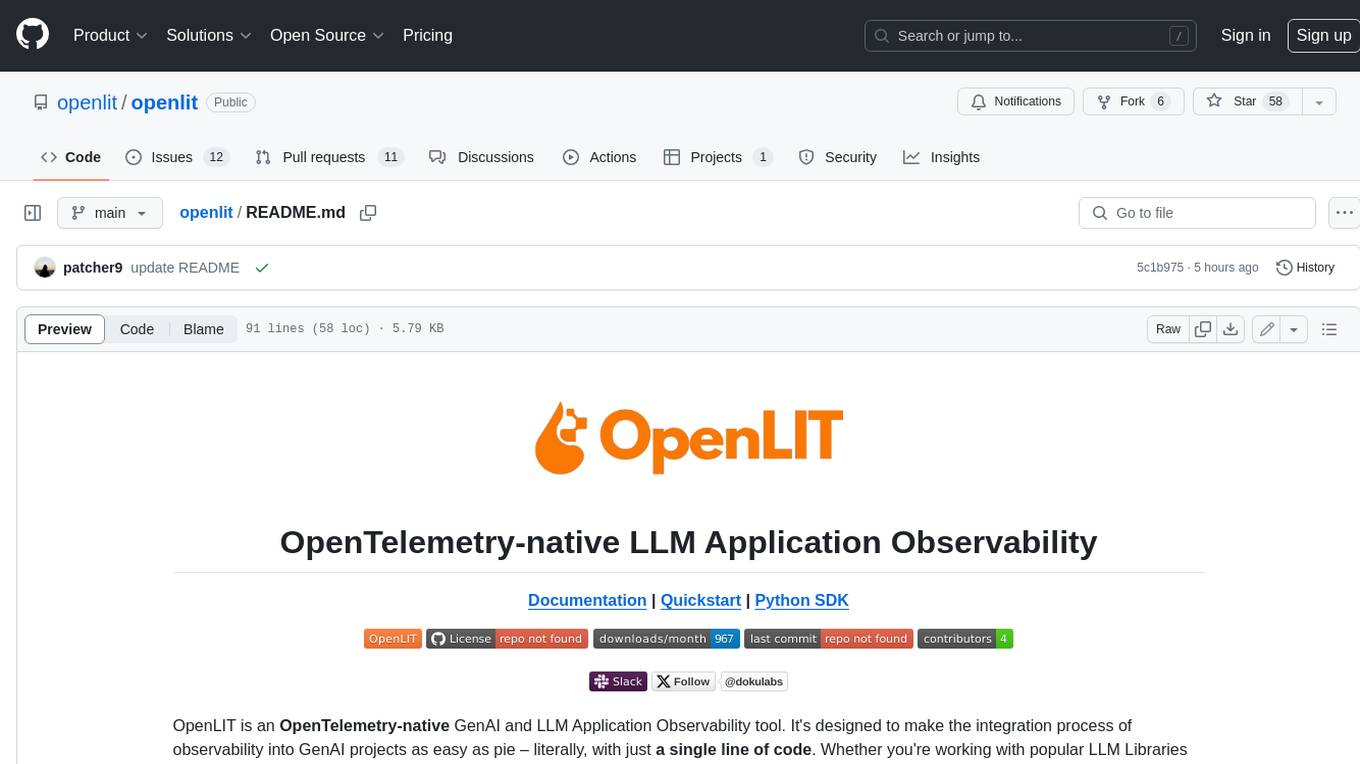
doku
OpenLIT is an OpenTelemetry-native GenAI and LLM Application Observability tool. It's designed to make the integration process of observability into GenAI projects as easy as pie – literally, with just a single line of code. Whether you're working with popular LLM Libraries such as OpenAI and HuggingFace or leveraging vector databases like ChromaDB, OpenLIT ensures your applications are monitored seamlessly, providing critical insights to improve performance and reliability.
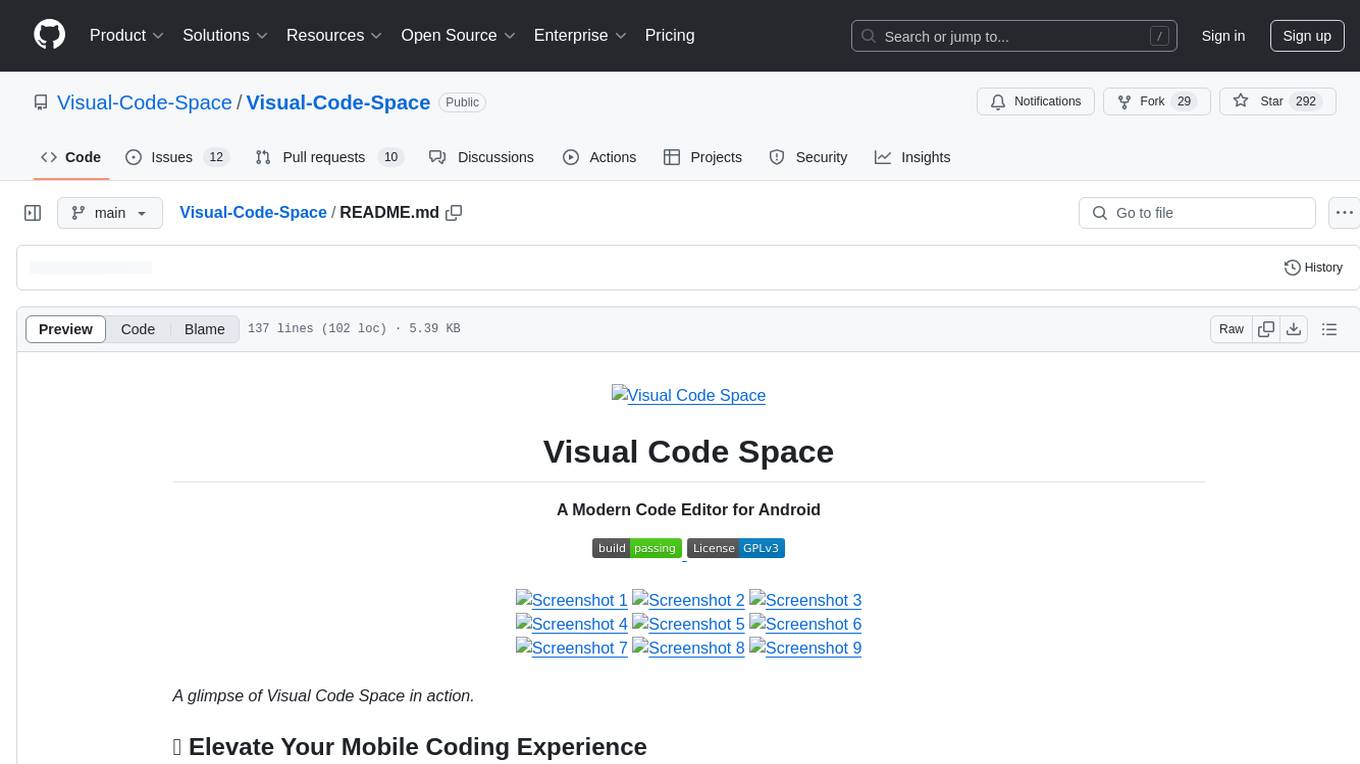
Visual-Code-Space
Visual Code Space is a modern code editor designed specifically for Android devices. It offers a seamless and efficient coding environment with features like blazing fast file explorer, multi-language syntax highlighting, tabbed editor, integrated terminal emulator, ad-free experience, and plugin support. Users can enhance their mobile coding experience with this cutting-edge editor that allows customization through custom plugins written in BeanShell. The tool aims to simplify coding on the go by providing a user-friendly interface and powerful functionalities.

labelbox-python
Labelbox is a data-centric AI platform for enterprises to develop, optimize, and use AI to solve problems and power new products and services. Enterprises use Labelbox to curate data, generate high-quality human feedback data for computer vision and LLMs, evaluate model performance, and automate tasks by combining AI and human-centric workflows. The academic & research community uses Labelbox for cutting-edge AI research.

gpt4all
GPT4All is an ecosystem to run powerful and customized large language models that work locally on consumer grade CPUs and any GPU. Note that your CPU needs to support AVX or AVX2 instructions. Learn more in the documentation. A GPT4All model is a 3GB - 8GB file that you can download and plug into the GPT4All open-source ecosystem software. Nomic AI supports and maintains this software ecosystem to enforce quality and security alongside spearheading the effort to allow any person or enterprise to easily train and deploy their own on-edge large language models.
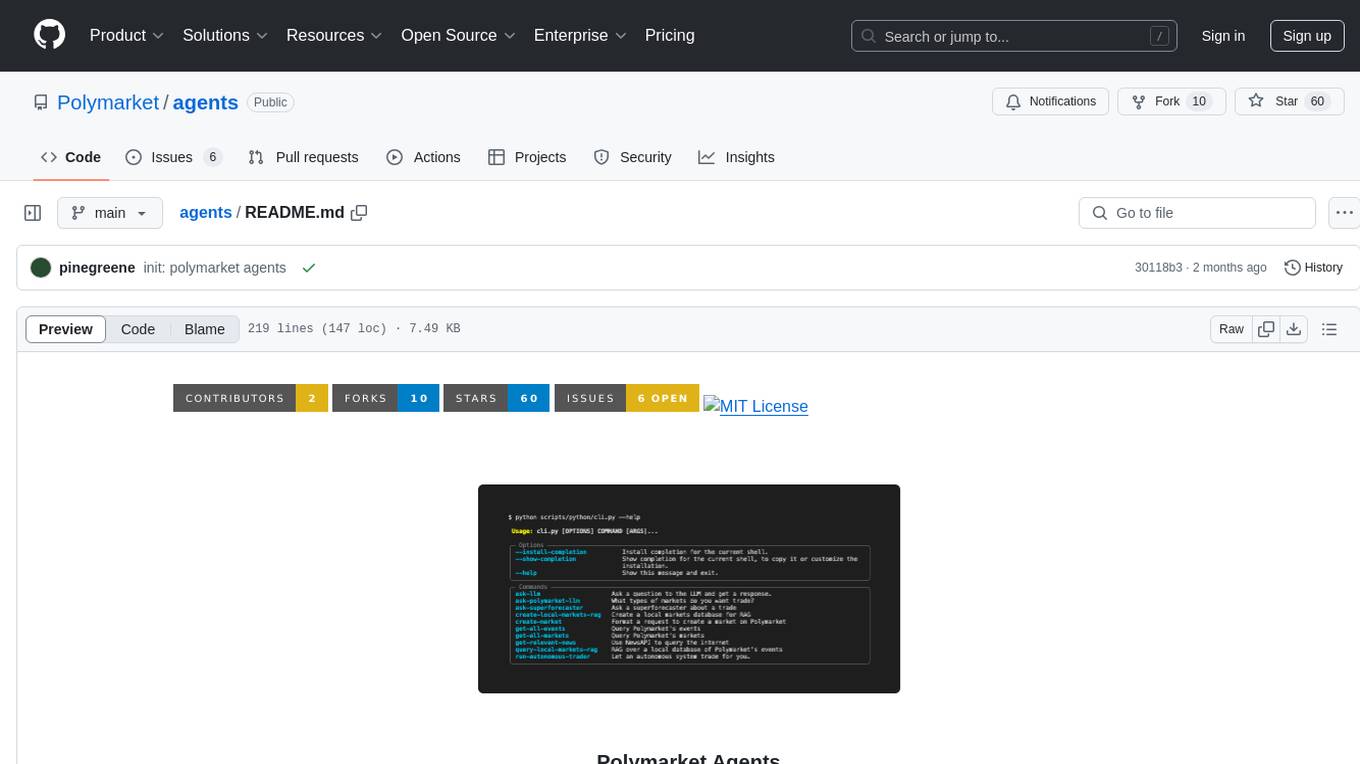
agents
Polymarket Agents is a developer framework and set of utilities for building AI agents to trade autonomously on Polymarket. It integrates with Polymarket API, provides AI agent utilities for prediction markets, supports local and remote RAG, sources data from various services, and offers comprehensive LLM tools for prompt engineering. The architecture features modular components like APIs and scripts for managing local environments, server set-up, and CLI for end-user commands.
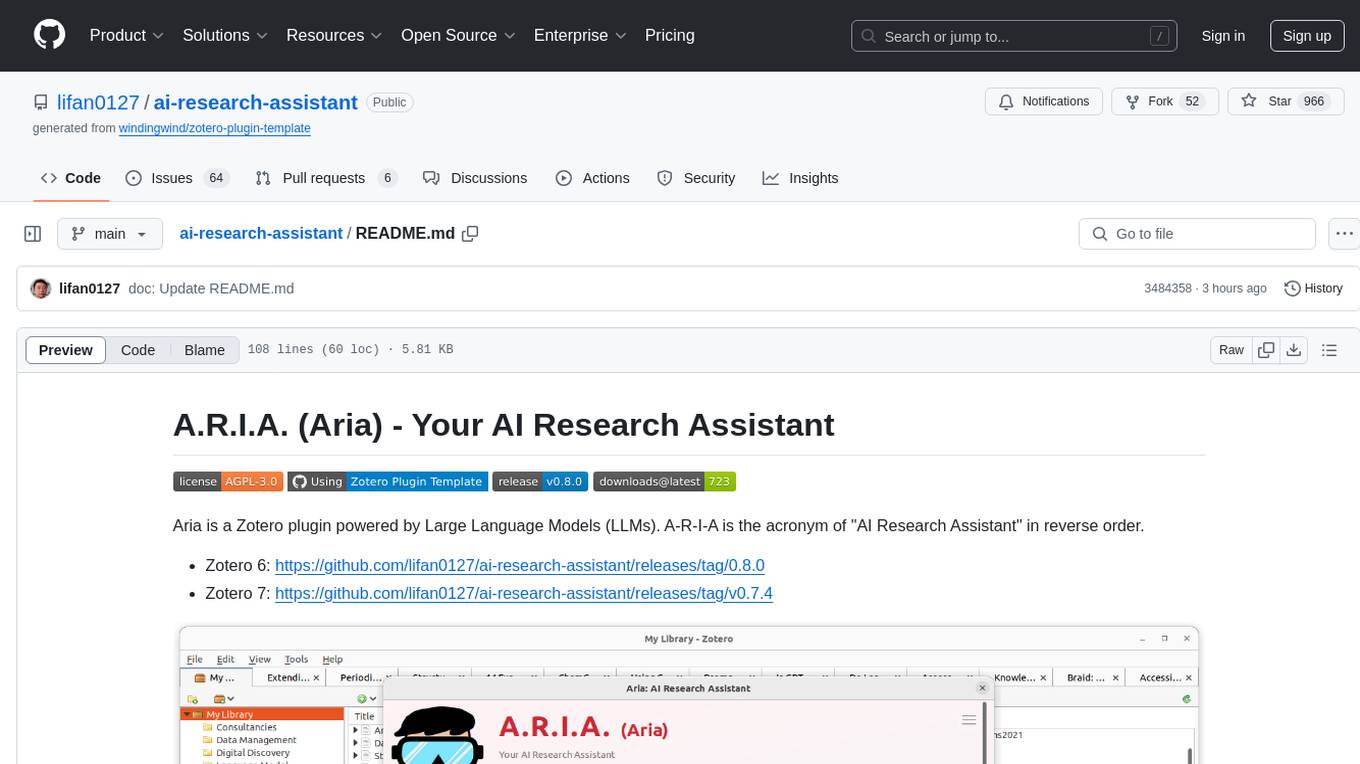
ai-research-assistant
Aria is a Zotero plugin that serves as an AI Research Assistant powered by Large Language Models (LLMs). It offers features like drag-and-drop referencing, autocompletion for creators and tags, visual analysis using GPT-4 Vision, and saving chats as notes and annotations. Aria requires the OpenAI GPT-4 model family and provides a configurable interface through preferences. Users can install Aria by downloading the latest release from GitHub and activating it in Zotero. The tool allows users to interact with Zotero library through conversational AI and probabilistic models, with the ability to troubleshoot errors and provide feedback for improvement.

dify
Dify is an open-source LLM app development platform that combines AI workflow, RAG pipeline, agent capabilities, model management, observability features, and more. It allows users to quickly go from prototype to production. Key features include: 1. Workflow: Build and test powerful AI workflows on a visual canvas. 2. Comprehensive model support: Seamless integration with hundreds of proprietary / open-source LLMs from dozens of inference providers and self-hosted solutions. 3. Prompt IDE: Intuitive interface for crafting prompts, comparing model performance, and adding additional features. 4. RAG Pipeline: Extensive RAG capabilities that cover everything from document ingestion to retrieval. 5. Agent capabilities: Define agents based on LLM Function Calling or ReAct, and add pre-built or custom tools. 6. LLMOps: Monitor and analyze application logs and performance over time. 7. Backend-as-a-Service: All of Dify's offerings come with corresponding APIs for easy integration into your own business logic.
For similar tasks

BotServer
General Bot is a chat bot server that accelerates bot development by providing code base, resources, deployment to the cloud, and templates for creating new bots. It allows modification of bot packages without code through a database and service backend. Users can develop bot packages using custom code in editors like Visual Studio Code, Atom, or Brackets. The tool supports creating bots by copying and pasting files and using favorite tools from Office or Photoshop. It also enables building custom dialogs with BASIC for extending bots.
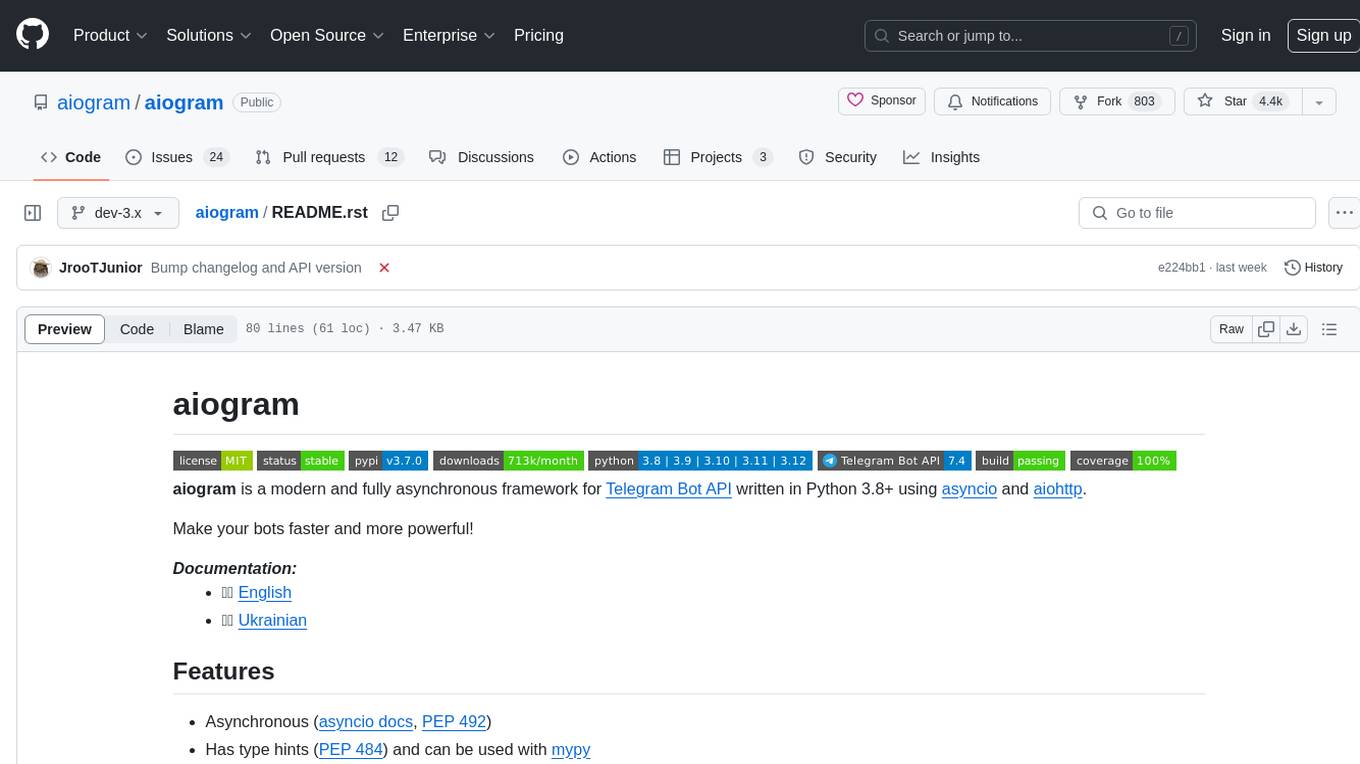
aiogram
aiogram is a modern and fully asynchronous framework for Telegram Bot API written in Python 3.8+ using asyncio and aiohttp. It helps users create faster and more powerful bots. The framework supports features such as asynchronous operations, type hints, PyPy support, Telegram Bot API integration, router updates, Finite State Machine, magic filters, middlewares, webhook replies, and I18n/L10n support with GNU Gettext or Fluent. Prior experience with asyncio is recommended before using aiogram.
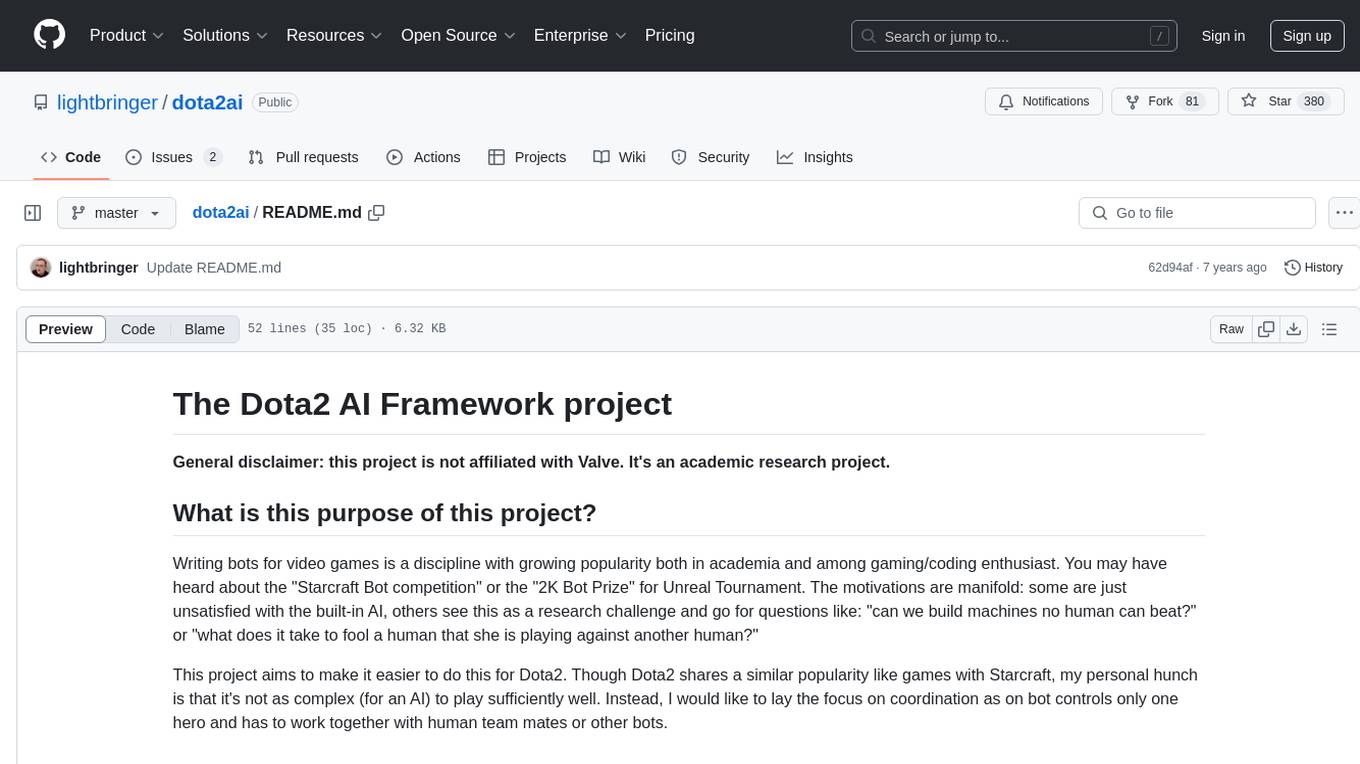
dota2ai
The Dota2 AI Framework project aims to provide a framework for creating AI bots for Dota2, focusing on coordination and teamwork. It offers a LUA sandbox for scripting, allowing developers to code bots that can compete in standard matches. The project acts as a proxy between the game and a web service through JSON objects, enabling bots to perform actions like moving, attacking, casting spells, and buying items. It encourages contributions and aims to enhance the AI capabilities in Dota2 modding.
For similar jobs

sweep
Sweep is an AI junior developer that turns bugs and feature requests into code changes. It automatically handles developer experience improvements like adding type hints and improving test coverage.

teams-ai
The Teams AI Library is a software development kit (SDK) that helps developers create bots that can interact with Teams and Microsoft 365 applications. It is built on top of the Bot Framework SDK and simplifies the process of developing bots that interact with Teams' artificial intelligence capabilities. The SDK is available for JavaScript/TypeScript, .NET, and Python.

ai-guide
This guide is dedicated to Large Language Models (LLMs) that you can run on your home computer. It assumes your PC is a lower-end, non-gaming setup.

classifai
Supercharge WordPress Content Workflows and Engagement with Artificial Intelligence. Tap into leading cloud-based services like OpenAI, Microsoft Azure AI, Google Gemini and IBM Watson to augment your WordPress-powered websites. Publish content faster while improving SEO performance and increasing audience engagement. ClassifAI integrates Artificial Intelligence and Machine Learning technologies to lighten your workload and eliminate tedious tasks, giving you more time to create original content that matters.

chatbot-ui
Chatbot UI is an open-source AI chat app that allows users to create and deploy their own AI chatbots. It is easy to use and can be customized to fit any need. Chatbot UI is perfect for businesses, developers, and anyone who wants to create a chatbot.

BricksLLM
BricksLLM is a cloud native AI gateway written in Go. Currently, it provides native support for OpenAI, Anthropic, Azure OpenAI and vLLM. BricksLLM aims to provide enterprise level infrastructure that can power any LLM production use cases. Here are some use cases for BricksLLM: * Set LLM usage limits for users on different pricing tiers * Track LLM usage on a per user and per organization basis * Block or redact requests containing PIIs * Improve LLM reliability with failovers, retries and caching * Distribute API keys with rate limits and cost limits for internal development/production use cases * Distribute API keys with rate limits and cost limits for students

uAgents
uAgents is a Python library developed by Fetch.ai that allows for the creation of autonomous AI agents. These agents can perform various tasks on a schedule or take action on various events. uAgents are easy to create and manage, and they are connected to a fast-growing network of other uAgents. They are also secure, with cryptographically secured messages and wallets.

griptape
Griptape is a modular Python framework for building AI-powered applications that securely connect to your enterprise data and APIs. It offers developers the ability to maintain control and flexibility at every step. Griptape's core components include Structures (Agents, Pipelines, and Workflows), Tasks, Tools, Memory (Conversation Memory, Task Memory, and Meta Memory), Drivers (Prompt and Embedding Drivers, Vector Store Drivers, Image Generation Drivers, Image Query Drivers, SQL Drivers, Web Scraper Drivers, and Conversation Memory Drivers), Engines (Query Engines, Extraction Engines, Summary Engines, Image Generation Engines, and Image Query Engines), and additional components (Rulesets, Loaders, Artifacts, Chunkers, and Tokenizers). Griptape enables developers to create AI-powered applications with ease and efficiency.

